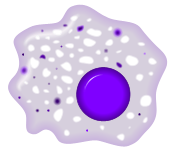Understanding cancer metastasis – possible new therapeutic targets
.
“Scientists at Dalhousie University in Nova Scotia have identified a key mechanism of metastasis that could lead to blocking tumor growth if their findings are confirmed.”
Loved this opening to an AACR press release about a key paper (freely available for anyone to download – see the reference session below) that was just published in Cancer Research by David Waisman’s group.
Now, before getting into the technical details, I was reflecting recently on both my recent awesome trip to the MD Anderson basic research campus at Smithville, Austin where a lot of research into tumorigenesis is conducted and pointed questions from patients about why their hasn’t been enough progress in treating and curing metastatic breast cancer.
There are several obvious reasons for this:
- We need to understand more about the basic mechanisms underpining function, never mind work out what role various proteins have and how they interact in health and disease before we can even think about clinical progress.
- As we learn more about the basic process of tumorigenesis, so we can start to apply those findings to clinical research and translational medicine in developing better predictive biomarkers that are clinically meaningful.
- If we have excellent biomarkers, an understanding of the processes and the targets involved, thus we should have clearer targets that suggest more logical combinations to treat disease and essentially slow or even undo the process of metastasis.
Quite frankly, based on the little we really know about the underlying biology of advanced disease, I’m sometimes surprised the results are as good as they are. That’s not to say we’re doing great, becasue clearly there is a lot of improvement that can be made, but sometimes we should stop and look at how far we’ve come and ask serious questions about what we really need to know now that can help progress things?
With all that context in mind, the current published research from Phipps et al., (2011) is worth looking at because it advances our thinking a little more. In the past, people have focused on cancer cells, thinking they were the main thing that mattered. What’s interesting about this research is that it shows how important other cells, such as macrophages, are in the tumorigenesis process:
“There is an increasingly large body of evidence correlating tumor-associated macrophage (TAM) density with poor prognosis in a varied number of solid tumors.”

Source: wikipedia
We also know from basic research that macrophages are critical in driving tumour growth, invasion, and metastasis. Macrophages are like the Pacmen of cells – think of them moving around the blood stream chomping things in their wake. The thing is, there are always macrophages in tumours – so how do they get from the bloodstream to the tumour?
The current paper details the key role that the macrophage cell surface protein, S100A10, plays in mediating macrophages, thereby allowing them to move to the site of tumour growth. This process is obviously essential to tumour development and angiogenesis.
What also struck me though, was the research also detailed what happened in animals without the S100A10 protein:
“Growth of murine Lewis lung carcinomas or T241 fibrosarcomas was dramatically reduced in S100A10- deficient mice compared with wild-type mice.
Emphasis mine.
What does all this data mean?
In order to either slow or stop metastasis in its tracks, we need to understand the whole process better, thereby finding the weaknesses and chinks in the tumour.
These results clearly show the important role that S100A10 has in facilitating macrophage activity.
Now, S100A10 is a protein and proteins often (but not always, since some of them are currently thought to be undruggable) make very good targets for therapeutic intervention.
Of course, these results clearly need to be reproduced and confirmed by other groups, but if confirmed, they potentially give us some targets to aim at. For example, we could either look at blocking the macrophages in some clever way or target the S100A10 protein directly with a rationally designed targeted therapy. These apparoaches might potentially slow, or even stop, tumour growth.
What if we found some strategies that were effective? Maybe we could take the approach further and actually use it as a prevention strategy in high risk patients to actually prevent the development of metastasis occurring?
Time will tell, but personally, I was rather heartened by the this wonderful piece of research this morning.
References:
![]() Phipps, K., Surette, A., O’Connell, P., & Waisman, D. (2011). Plasminogen Receptor S100A10 Is Essential for the Migration of Tumor-Promoting Macrophages into Tumor Sites Cancer Research, 71 (21), 6676-6683 DOI: 10.1158/0008-5472.CAN-11-1748
Phipps, K., Surette, A., O’Connell, P., & Waisman, D. (2011). Plasminogen Receptor S100A10 Is Essential for the Migration of Tumor-Promoting Macrophages into Tumor Sites Cancer Research, 71 (21), 6676-6683 DOI: 10.1158/0008-5472.CAN-11-1748